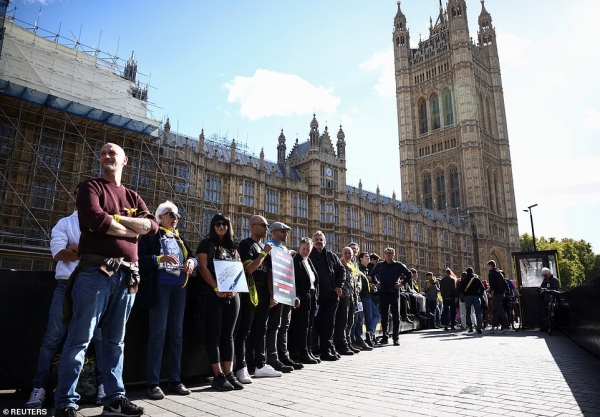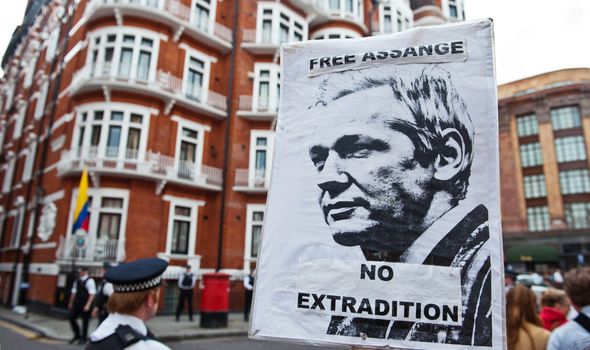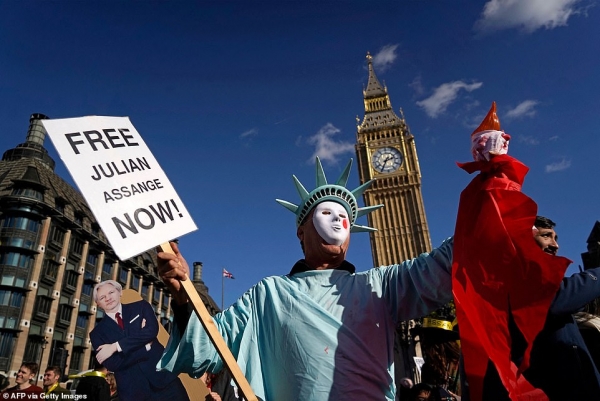
With Julian Assange facing extradition to the United States, we’ll likely be hearing more about his case and see more protests around the world very soon. His legal battle against extradition from the UK to the United States has been winding its way through the British courts for months. If he’s brought to the United States, the WikiLeaks founder faces a sentence of 175 years for charges that include 17 counts of violating the Espionage Act.
In case you’re a little fuzzy on Assange’s convoluted path to date, recall that most of us first heard about him after WikiLeaks released hundreds of thousands of sensitive and classified documents in 2010 — some of which documented torture, killings, and other war crimes carried out by the United States. Needless to say, Assange was not well received by the U.S. intelligence community.
Crucially, Assange’s case is not just about one man. It is also about news outlets like The New York Times and The Guardian, which published scores of stories based on information they were given by WikiLeaks. It was clearly a collaboration, yet only one guy is sitting in a British jail and facing a life sentence in the United States.
We might not always like or agree with people who become symbols of press freedom, but that freedom is essential to who we are as a nation.
Mark Fiore, Pulitzer-Prize winning political cartoonist said in the Progress.

Biden’s efforts to have Julian Assange extradited should be called out
It is called “the New York Times problem,” but it could just as easily be called “the Tribune problem.”
“The New York Times problem” is a legal boundary spelled out in 2013 when the Obama administration had significant internal debates about whether to prosecute WikiLeaks or its founder, Julian Assange.
The Obama Justice Department took a hard look at Assange, the renegade publisher who starting in 2010 released classified information leaked by then-soldier Chelsea Manning. Those revelations embarrassed the U.S. government by exposing alleged war crimes, civilian losses and other possible misconduct in Iraq, Afghanistan and Guantanamo Bay. Justice Department officials ultimately chose restraint, concluding that if they indicted Assange, they would have had to pursue The New York Times and other news outlets that had published some of the material.
In other words, it would have required crossing an important First Amendment boundary. To charge Assange, they would have to criminalize the same journalistic practices used by the Times, the Tribune and CNN. Media outlets large and small, traditional and online, are in the business of publishing scoops, leaks and all sorts of information that powerful people do not want the public to know.

AMLO has offered political asylum to Assange but he is uunder arrest in Britain pending extradition to the US to stand trial for espionage'' /AP
Donald Trump, however, had no compunctions about overturning Barack Obama’s decision and cracking down on press freedom when he became president.
His administration’s hostility toward the press — and by extension, the First Amendment — was among the most disgraceful aspects of the Trump presidency. Trump spoke of toughening libel laws, belittled established media outlets, mocked reporters and toyed with White House press access. His heated rhetoric rightly drew condemnation from the media, but his use of the Justice Department to go after sources and journalists was far more dangerous.
The Justice Department’s indictment of Assange was a clear signal that Trump’s antipathy toward the press was more than just rhetorical bluster. As journalist Glenn Greenwald, co-founder of The Intercept, phrased it, the move relied on legal theories that are part of “an entirely different universe of press freedom threats.”
The initial indictment against Assange was narrow: one shaky count of conspiracy to commit computer intrusion. That fact, combined with years of news coverage painting Assange as an unsympathetic figure, resulted in a tepid response to the indictment from mainstream news outlets. Some spoke up. Others, including the Tribune, took a wait-and-see approach.
![Sketch of Julian Assange. [Reuter=Yonhap]](/news/photo/202210/131251_117243_311.jpg)
Assange was arrested more than three years ago. The Trump administration tacked on 17 counts under the Espionage Act, all of them centered on Assange allegedly obtaining or disclosing so-called “national defense information” — in other words, receiving information from a source and then publishing it. His lawyers have said he faces 175 years in federal prison.
The expanded indictment drew stronger condemnation. The New York Times Editorial Board wrote that “it is aimed straight at the heart of the First Amendment.” The Guardian lamented that no one had been punished for the crimes that WikiLeaks had exposed and found that the charges against Assange “undermine the foundations of democracy and press freedom.”
News media outlets should be unanimous in their outrage that President Joe Biden has followed in Trump’s footsteps and continued to pursue this dangerous case.
The Tribune has done a commendable job providing space for those arguing against the government’s pursuit of Assange, running letters to the editor and even reprinting an op-ed by Assange himself.
![WikiLeaks founder Julian Assange has been fighting extradition to the US for years. [DW]](/news/photo/202210/131251_117244_3115.jpg)
But the Tribune Editorial Board’s stance has left much to be desired.
The Tribune Editorial Board call in 2018 for Assange to be expelled from London’s Ecuadorian embassy poisoned the well by amplifying smears and factual errors about the case and generally failed to appreciate the case’s broader implications for journalists, publishers and whistleblowers.
When the Ecuadorians revoked Assange’s asylum, and police arrested him in London, the editorial board characterized the development as overdue. The Tribune published a column by Steve Chapman a few days later that framed Assange’s indictment as a “victory for press freedom.”
Chapman’s take was pretzel logic: His suggestion that the American Civil Liberties Union and the Freedom of the Press Foundation “should be relieved, if not enthusiastic” strains credulity. The Espionage Act charges that followed in May 2019 have nothing to do with “hacking” and everything to do with industry-standard newsgathering and publishing activities.
![A supporter of WikiLeaks founder Julian Assange protests outside the Royal Courts of Justice in London, UK [Reuters]](/news/photo/202210/131251_117245_3132.jpg)
James Goodale, former general counsel and vice chair of The New York Times, has called on editorial boards throughout the country to condemn the prosecution of Assange. To Goodale, who represented the Times in four U.S. Supreme Court cases — including the landmark Pentagon Papers case — the true danger lies in moderate figures, such as Biden, perpetuating Trump’s repressive, anti-journalism policies.
In a way, “the New York Times problem” is a microcosm for recent administrations’ perspectives on the rule of law and freedom of the press. The Obama administration showed restraint. The Trump administration showed recklessness and contempt.
[Chicage Tribune/ WikiLeaks]




wiki@wikileaks-kr.org


